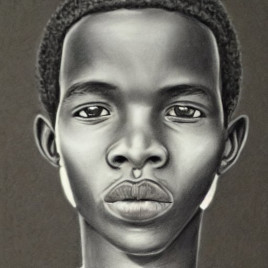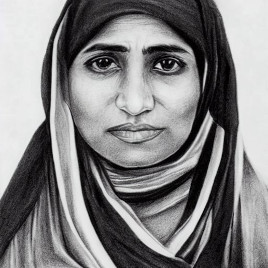Scenario Narrative
Tense but stable geopolitical situation
The tension between the geopolitical blocs has led all sides to seek stabilisation. To maintain the status quo, they aim to avoid regime changes and large-scale migration in all parts of the world. The support for the economic development in the global South is an important part of this effort and it includes technological as well as financial aid. Many authoritarian governments profit from this support. They use new technologies to pacify their populations by providing cheap food, minor economic development and escape from everyday life via digital entertainment.
Misuse and benefit of new digital possibilities
In countries of origin, surveillance technologies (including the use of social media and mobile telephones) are used by governments to target dissident individuals. “The surveillance state” across several countries allows for more targeted, keyhole identification of dissidents and/or minorities and subsequent persecution of certain groups. Authoritarian/totalitarian regimes increasingly target IT systems to identify oppositional movements and minorities for monitoring and persecution. Additional digital tactics include the manipulation of narratives on social media to hinder the communication between the suppressed groups, as well as interventions to frustrate the efforts of the opposition to organise and mobilise.
At the same time, ultra-secure databases for migration and automated monitoring systems are provided in receiving and transit countries. This situation reflects the digital technology competition between the global superpowers. Where access to uncensored sources of information is possible, it allows minorities’ awareness of their rights and international solidarity. Strong international civil society organisations provide networks for minority groups in order to educate minorities on human rights and report human rights violations.
The geospatially restricted social media landscape enables state-backed misinformation campaigns and societal surveillance, while simultaneously allowing for greater capacities to improve networking and digital literacy for the suppressed groups and asylum seekers. Given the capacities for regimes to censor and manipulate messages within their territorialised networks, decentralised social media and other next generation web applications use blockchain technologies to help migrants and asylum seekers identify legitimate information on their rights and available resources and to facilitate other aspects of the asylum seeking.
Remote asylum procedures
The launch of automated immigration processing support systems is intended to control modes of asylum seeking and several countries have mandated remote asylum application lodging and processing as the sole mode. Embassies and consulates, using their sovereign territory, are to some extent able to provide safe and secure space and infrastructure for the lodging of asylum applications. Those applications are then sent to the central services of the national asylum authorities, which issue a decision based on the application and interviewing done online.
The widespread adoption of artificial intelligence-based analytical technologies – both for asylum application processing and monitoring of asylum seekers’ environments and contextual conditions – facilitates more timely asylum application procedures and helps provide greater in situ safety for migrants. This includes the broad deployment of secure, accurate biometric systems (facial/iris/voice- and gait-recognition) to identify and track both migrants and the individuals in their vicinity.
Sponsorship programmes that use remote procedures to pair asylum seekers with hosts successfully operate in some key transit countries. Even though international refugee law remains in force, many countries are opting out and are refusing to host or allow entrance to asylum seekers. Bilateral agreements with transit countries addressing refugee support responsibilities and safety measures are blossoming.
Innovative solutions to cope with climate change
Droughts are more frequent, widespread and longer lasting, adversely affecting crop yields and livelihoods. However, the adoption of new nutrition sources, new irrigation technologies and the reduction of food waste are mitigating many of these effects. Insects have become a regular part of human food intake, especially those that thrive in dry areas. Genetically modified food technology, aquaponics and saline farms enable concentrated, regionally adapted agriculture. International financial support allows localised rebuilding and resettling to mitigate disaster and climate change-induced displacement. However, the extensive use of new technologies goes hand in hand with the problem that in some regions educationally disadvantaged people, in particular, are left behind as their home countries modernise.
Digitally savvy asylum seekers
Extensive international efforts aimed at avoiding regime change and improving the economic situation in the global South to stabilise the situation are proving somewhat successful and are to some extent narrowing the economic migration. Mixed migration has therefore become less diverse with respect to migrants’ countries of origin and educational background. There is technological competition between the two blocs. In one block, digital platforms that are characterised by state-controlled surveillance. Digital literacy has become a crucial prerequisite skill for navigating the international protection procedures.
Personas
Disclaimer: The images used for the scenario personas are not real people.

Tadesse
Tadesse is from Tigray in Ethiopia, wherein the national government continues to persecute and evict people from their tribal lands. He is 18 years old (though he is claiming to be 16 in the asylum application process) and he is currently in Sudan having arrived as a part of a caravan that cost him all of his money. The human traffickers that helped him get to Sudan insist that he still owes money and that he can only pay his debts if he assists them in further human trafficking activities. He wants to escape to Europe and has started taking up as much work as he can find (e.g. construction, courier, cleaning). He has some level of schooling, though he was forced to drop out when his father was killed as a member of the Tigray People’s Liberation Front. He inherited the family farm but was evicted through persecution and official corruption. He is travelling alone and has many fears of being killed or imprisoned if caught by police or soldiers, but he is confident that the story of his tribe’s persecution is so well-known (through non-governmental organisation (NGO) reports and social media news) that his application will be accepted. As his official passport and national ID card were lost during the journey, he has facial biometrics and fluency in his native language as primary ID documents (though he does have digital pictures of those documents on a Chinese social media platform). He wants to go to Europe, where many other Ethiopians on social media have assured him that he will receive good social benefits as a minor. He is concerned that invasive medical procedures will unveil his true age, that he will not be welcomed in his destination country and that he will be returned to Ethiopia even as he waits on his application. However, if he is forced to go back, he will be able to protect his younger brothers and seek revenge for the killing of his father.

Hajar
Hajar lives in the town of Ashgabat in Turkmenistan (Baloch). She is 37 years old and is being evicted from her home by the pressures of a foreign mining company. To fight against this eviction and for worker rights in general, she has become very politically active and is now being persecuted for her activism. She has a university degree and used to work for a mining company as an administrative assistant at the company’s headquarters in the capital. She has gathered supporters from the mining company’s home nation, secured the legal assistance of an NGO and has evidence of the violence she faces in her current location. As a single mother who is also pregnant, she has some anxieties regarding the international protection journey and process, but the father of her children is currently working in Europe where she will be applying for international protection. She speaks Russian and English and would like to find employment that matches her qualifications, so as to continue to climb in her career.
Scenario Challenges
Geo-Political Challenges
- The quota system regarding the total number of asylum seekers allowed to apply for international protection creates a significant challenge for institutions to navigate. As this represents a fundamental shift in the legal basis for international protection, such a move would require new approaches to pre-assessing potential applicants.
- The quota system might lead to a situation where people have been granted international protection status, but access to the receiving country is delayed because the quota is already filled. In these cases, the complicated task of safeguarding refugees may become a new obligation.
- Similarly, the scenario postulates that some refugees might be denied access to transit countries, even if their applications have been remotely processed and granted protection. This again sets up the question of responsibility for the care-taking of refugees pre-arrival.
Digitalisation and Data Challenges
- This scenario emphasises the challenges that impoverished and/or undereducated applicants may face with regard to applying for international protection. This includes the digital divide as it affects technological literacy for using remote application platforms and inequality in resources available for undertaking the migration journey.
- The broad adoption of technologies for state surveillance activities creates new challenges for international protection particularly as surveillance enables persecution of state targeted groups and will require a profound understanding of these technologies at international protection authorities as well.
- The technological competition between super blocs implies little interoperability between technologies from different blocs. This could entail different types of database organisation or encryption, different communication standards, interfaces, etc. Thus, using information technologies from different blocs – for identity confirmation or other assessment measures – would require specialist knowledge and capabilities.
- Digital capabilities presented in this scenario are a challenge for international protection authorities in terms of acquiring and maintaining the IT infrastructures that underline remote application lodging.
- The scenario implies that automated immigration processing support is increasingly ubiquitous, and thus plays an important role in international protection. This points to the following challenges:
- the development and use of standards AI across the different institutions for international protection,
- and the development of explainable AI to provide transparency in the quality assessment of system results.
Climate Change Challenges
- This scenario implies that each super bloc is taking steps to alleviate effects of climate change within their respective territory, but that this uncoordinated approach is having unintended environmental consequences, and produces new types of migrants due to environmental pressures and or resource scarcity. A good example here might be water management, if one block uses techniques (cloud-seeding, damming waterways, etc.) that adversely effect and displace populations in other blocs.
- Technological approaches to alleviate the effects of climate change are dominant in this scenario, but some technologies (e.g. biotechnological mitigation or geo-engineering) might lead to unintended effects in the long run and in other parts of the world. For example, over utilisation of fertilizer might alleviate short term food shortages, but cause irreversible soil damage and water pollution (aquifers) in the long run or in other regions, and create resource shortages and displaced populations.